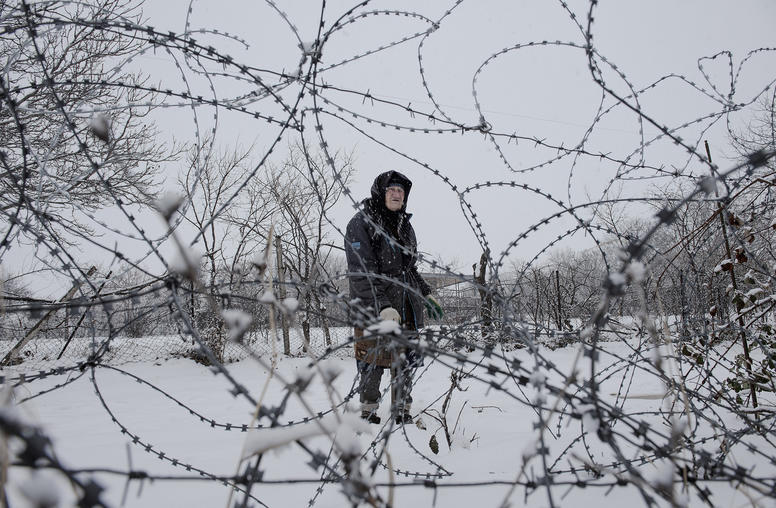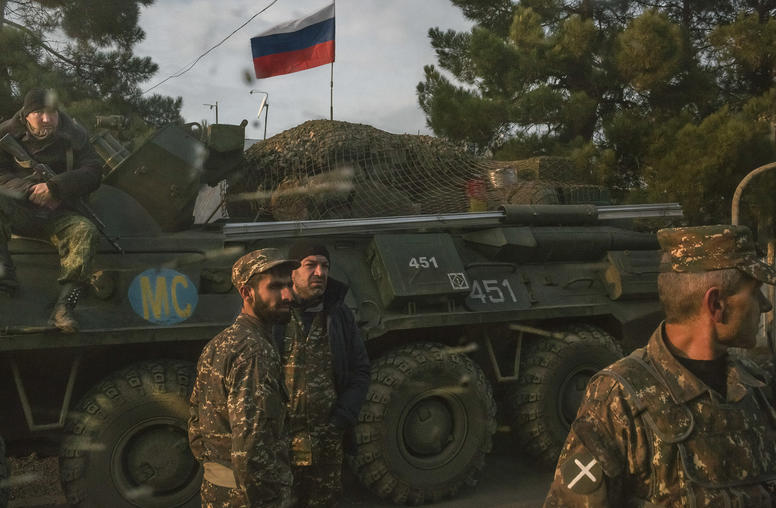Why Georgians Are Protesting Against Russian Influence
A diverse coalition of protesters rejected Russian-inspired legislation that would have undercut potential EU integration and limited press freedom.
Earlier this month, the ruling Georgian Dream party withdrew proposed “foreign agent” bills that have been a source of contestation in the country, particularly over the last year. A diverse coalition of Georgians hit the streets to protest these bills, which they said would be a blow to Georgia’s democracy and undercut its efforts to be a candidate for European Union membership. Just as Ukrainians are resisting Russia’s illegal invasion, these Georgian protesters fear growing Russian influence in their country, which is already partly occupied by Russia. The bills’ collapse in the Georgian parliament revealed the power of civil society resistance and the continued fight within the country for European integration and democracy.

If legislated into law, these bills would have required NGOs, media outlets and other organizations receiving more than 20 percent of their funding from foreign entities to identify as foreign agents. These bills would have also labeled individuals as “agents of foreign influence” for engaging in vaguely described political activities. If they had been implemented, it would have severely circumscribed Georgia’s democracy, civil society and media.
Georgia’s Democracy on the Line
The struggle against this Russian-inspired legislation reveals how much is at stake for Georgia and its future. A recently established offshoot of Georgian Dream, the nationalistic and anti-Western People's Power Movement proposed these bills to allegedly protect Georgia’s sovereignty from danger in all directions. Georgian Dream embraced their proposal, claiming the bills would increase transparency. Despite these purported objectives, in practice the proposed foreign agent bills threatened to stigmatize and obstruct the work of organizations and media networks — relying on foreign funding — who serve the public and bolster Georgia’s democracy.
While supporters in the Georgian parliament for the second bill on the “Registration of Foreign Agents” compared it to the U.S. Foreign Agent Registration Act because of requirement to disclose receiving payment from foreign entities to lobby, the bill on “Transparency of Foreign Influence” has been noted for its striking similarities to Russia’s 2012 foreign agent law. Russia’s foreign agent law capitalized on the public’s fears of foreign influence, leading Russians to construe organizations ensnared by the bill as dangerous spies. Once Russian NGOs and media outlets were branded as foreign agents, they endured irreparable damage to their reputations, leading to at least 148 vital groups shutting down their activities since 2016.
Russia’s shadow looms large over Georgian politics and society. As Russia wages an unprovoked war of aggression against Ukraine, it is also occupying 20 percent of Georgia’s territory. In addition to Russian occupation, Georgians are also dealing with a significant number of Russian migrants who moved to the country to flee Putin’s mobilization and the impact of sanctions on Russia. The protests challenging the bills were also demonstrations against Russian influence in Georgia and the right for Georgians to choose their own future.
The protests demonstrated Georgians’ aspirations for engagement and integration with Europe — not Russia. As Georgian President Salome Zourabichvili noted in a recent interview, the country is waiting on a decision from the European Union on its candidate status. In 2022, the European Union approved Ukraine and Moldova for EU candidate status, and Georgians desire a similar outcome. Last year, the EU outlined 12 points for Georgia to achieve to receive candidate status, which included free and independent media, and strong involvement from civil society in all levels of governance. There are high hopes among Georgians that their country can take the necessary steps to join the EU. But, at the end of 2022 when Georgia should have been reporting on its efforts to address the EU’s 12 points, the People’s Power Movement proposed one of foreign agent bills in parliament.
Why the Protests Worked
The protests worked because of their diversity and mobilization of large numbers of people, Georgian civil society’s investment and commitment to EU integration, and the use of media to highlight the challenges that the two bills posed for Georgian democracy. Four hundred Georgian human rights groups, research organizations and media outlets released a joint statement denouncing the so-called “Russian law” as an attack on Georgia’s civil society and people. The protesters and others who opposed the two draft bills included students, young people, women, journalists, professionals, artists and groups representing issues from disability rights to entrepreneurship. Protesters signaled their enduring fight against Russian influence by waving flags not just for their country, but for the EU and Ukraine.
Opposition members of parliament played an equally important role in the protest's success by denouncing Georgian Dream’s use of misinformation to justify the bills and calling upon their constituency to stage rallies. Another important factor was that the protests were largely nonviolent — and historically nonviolent protests are twice as likely to succeed as armed conflict.
Georgian Dream’s inability to disprove similarities to the Russian foreign agent law galvanized protesters. The party attempted to deflect allegations of Russian influence through the second proposed bill, which drew on the U.S. Foreign Agent Registration Act, but protesters were not convinced.
Even though Georgian Dream succumbed to public pressure, protests persist as Georgians are increasingly disillusioned by the ruling party’s failure to disengage with Moscow and make concentrated efforts toward EU integration. Since 2019, thousands of Georgians have mobilized in Tbilisi to protest Georgian Dream victories, Russian influence in the country, and slow-moving electoral reform. They have also boycotted visiting Russian legislators, voiced displeasure with the recent influx of Russian migrants into Georgia and the tensions resulting from their presence in the country, and a called out the government for a perceived lack of support for Ukraine’s fight against Russian aggression. Civil society resistance has become a key tool for Georgian civil society to push for changes in their government and hold them accountable.
What is Next for Georgia?
While significant challenges remain for Georgian politics and civil society, these protests are a bright spot worth highlighting. They showed the world Georgians’ aspirations for democracy and Western engagement, and that they would stand against limitations on their freedoms. Before the protests, there was little international attention focused on the bills and the similarities to the 2012 Russian law as they moved through the parliament. But since the protesters hit the streets, the U.S. government and the European Union have openly expressed their support for Georgian protesters and critiqued the bills.
The United States should continue its strong engagement with the countries in the South Caucasus, which include Georgia, Armenia and Azerbaijan. Fostering peace and stability in the South Caucasus is in U.S. interests and Secretary of State Antony and senior U.S. Government officials have demonstrated the region’s importance through engagement with South Caucasus heads of state, hosting foreign ministers for peace talks in Washington, and supporting Georgia’s Euro-Atlantic integration.
The Organization for Security and Cooperation in Europe (OSCE) can also play a significant role in Georgia and, the South Caucasus more broadly, by supporting an engaged civil society and independent media. With the Russian government grasping to maintain its hold over Georgia, Armenia and Azerbaijan, it has never been more important for the United States to support multilateral institutions such as the OSCE that can enhance U.S. and EU efforts to train, equip and convene civil society organizations to strengthen democracy.
The protests in Georgia have underscored the need for dialogue between opposing factions in the Georgian government with strong participation from civil society. In the absence of mediated dialogue, the current political tensions in the country could hurt Georgia’s attempts at Euro-Atlantic integration. Countries interested in the success of Georgian democracy can play an active role in facilitating and enabling political dialogue that allows Georgians from different segments of society and political institutions to feel that they have a say in the future of their country.
Manon Fuchs is a research assistant for the Russia and Europe Center at the U.S. Institute of Peace.



